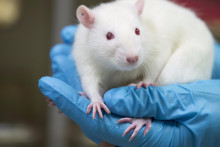The research group, led by Jai Prakash from the UT’s MIRA Institute, is using a very unique approach to battle cancer. ‘We don’t focus on tumor cells, but on the cells that help them grow. Using our patented peptide, we are able to shut down the microenvironment that supports the tumor,’ explains Prakash, who is the Associate Professor of Targeted Therapeutics at the Department of Biomaterials, Science and Technology.
Killing more than 80% of cancer
This radically different approach has been proven successful recently. ‘Our peptide was tested in a pancreatic cancer model in animals. Pancreatic cancer is the deadliest cancer and there is no successful treatment yet,’ continues Prakash. ‘We conducted experiments on mice using human patients’ tumors. These were very aggressive tumors, but we applied our peptide in combination with chemotherapy and this treatment inhibited more than 80% of the cancer.’
These results have only been known for a month and Prakash’s group is still analyzing the recent experiments, aiming to fully understand the mechanism of this novel treatment. But some things are already clear. ‘Chemotherapy of course works to a certain extent, but it can’t fully penetrate the tumor. Our peptide shuts down the matrix that protects the tumor, and the chemotherapy can therefore get inside and work much better,’ clarifies Prakash.
Preventing scars
Prakash believes that the mentioned peptide, which he developed and patented, has the potential to be truly groundbreaking. Apart from its application in cancer treatment, it can be used to prevent skin scarring, and could therefore provide a revolutionary solution for burn victims. In fact, Prakash has founded a UT spin-off, ScarTec Therapeutics BV, which focuses on bringing this technology to the market as quickly as possible.
Would you like to read more about the research and its application? Be sure not to miss the December issue of our Science & Technology Magazine, in which you will find a big interview with Jai Prakash and more details about his company and the potentially revolutionary peptide developed at the UT.







